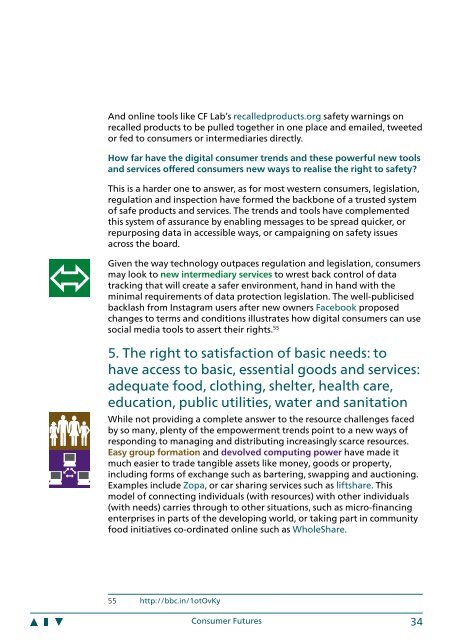Realising-consumer-rights
Realising-consumer-rights
Realising-consumer-rights
You also want an ePaper? Increase the reach of your titles
YUMPU automatically turns print PDFs into web optimized ePapers that Google loves.
And online tools like CF Lab’s recalledproducts.org safety warnings on<br />
recalled products to be pulled together in one place and emailed, tweeted<br />
or fed to <strong>consumer</strong>s or intermediaries directly.<br />
How far have the digital <strong>consumer</strong> trends and these powerful new tools<br />
and services offered <strong>consumer</strong>s new ways to realise the right to safety<br />
This is a harder one to answer, as for most western <strong>consumer</strong>s, legislation,<br />
regulation and inspection have formed the backbone of a trusted system<br />
of safe products and services. The trends and tools have complemented<br />
this system of assurance by enabling messages to be spread quicker, or<br />
repurposing data in accessible ways, or campaigning on safety issues<br />
across the board.<br />
Given the way technology outpaces regulation and legislation, <strong>consumer</strong>s<br />
may look to new intermediary services to wrest back control of data<br />
tracking that will create a safer environment, hand in hand with the<br />
minimal requirements of data protection legislation. The well-publicised<br />
backlash from Instagram users after new owners Facebook proposed<br />
changes to terms and conditions illustrates how digital <strong>consumer</strong>s can use<br />
social media tools to assert their <strong>rights</strong>. 55<br />
5. The right to satisfaction of basic needs: to<br />
have access to basic, essential goods and services:<br />
adequate food, clothing, shelter, health care,<br />
education, public utilities, water and sanitation<br />
While not providing a complete answer to the resource challenges faced<br />
by so many, plenty of the empowerment trends point to a new ways of<br />
responding to managing and distributing increasingly scarce resources.<br />
Easy group formation and devolved computing power have made it<br />
much easier to trade tangible assets like money, goods or property,<br />
including forms of exchange such as bartering, swapping and auctioning.<br />
Examples include Zopa, or car sharing services such as liftshare. This<br />
model of connecting individuals (with resources) with other individuals<br />
(with needs) carries through to other situations, such as micro-financing<br />
enterprises in parts of the developing world, or taking part in community<br />
food initiatives co-ordinated online such as WholeShare.<br />
55 http://bbc.in/1otOvKy<br />
Consumer Futures 34


